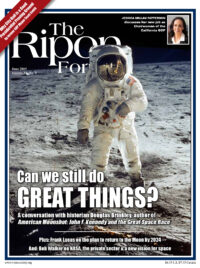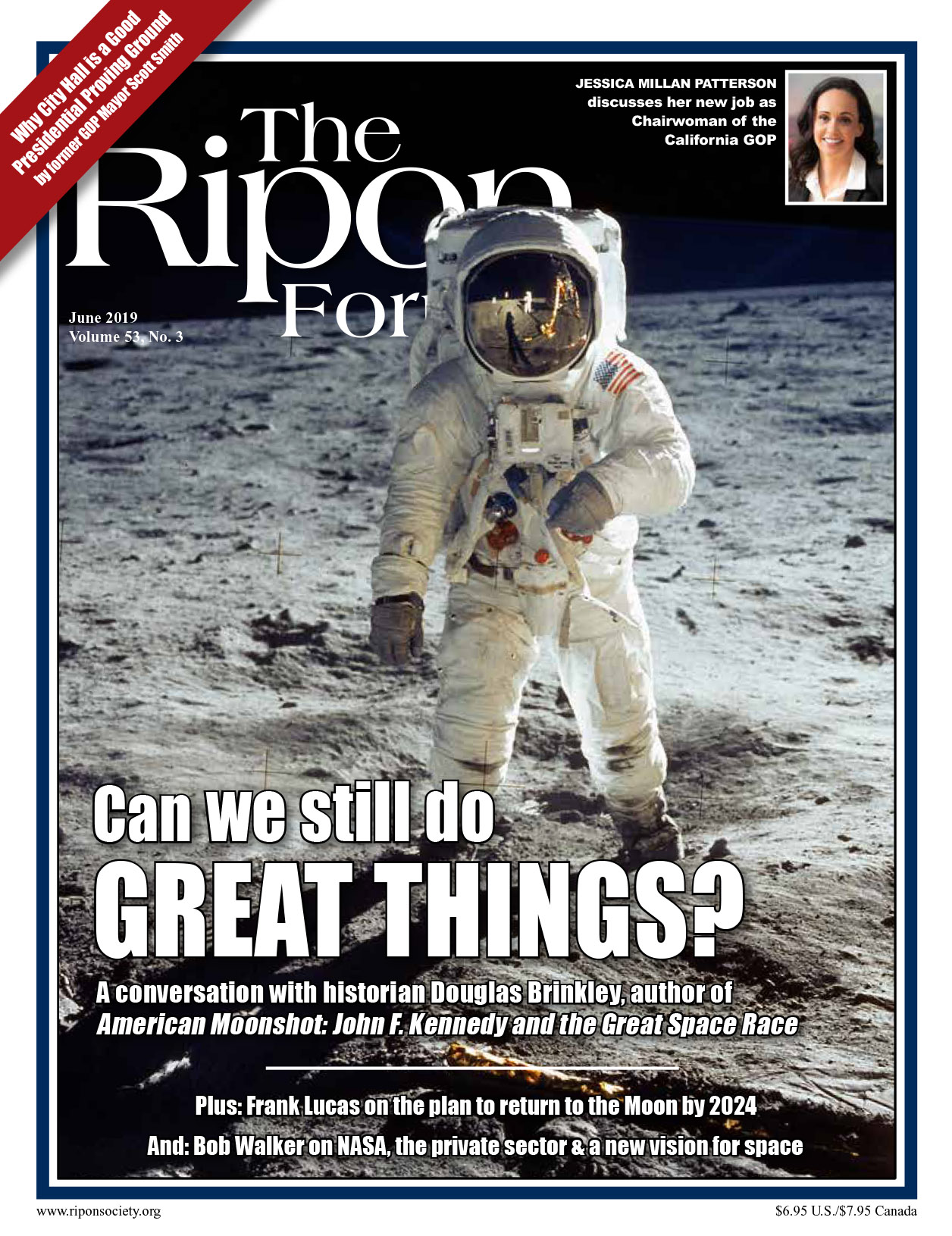One of the challenges of publishing a bimonthly journal is that you sometimes find yourself falling victim to the news of the day. This latest edition of The Ripon Forum is a good example.
Roughly one week before we were set to publish this edition focused on the 50th anniversary of Apollo 11 and the plan for America to return to the Moon, the President issued a Tweet saying that was not the case.
“For all of the money we are spending,” the nation’s 45th Chief Executive tweeted, “NASA should NOT be talking about going to the Moon – We did that 50 years ago. They should be focused on the much bigger things we are doing, including Mars (of which the Moon is a part), Defense and Science!”
For a moment, at least, it appeared the focus of this edition was no longer going to be, “Can we still do great things?” Rather, the focus was going to be, “Can we do anything?” But like so many of the President’s missives, this one was soon forgotten, and the plan to return to the Moon remained the official policy of NASA and the Trump White House, as well.
But still, as has also been the case with many of the President’s Tweets, there was an underlying truth to some of the points that he had raised. For instance, the United States has been to the Moon before. Why is it now a top national priority to go back? And with federal spending through the roof and the national debt at an all-time high, how can the federal government justify the expense?
This edition of the Forum attempts to answer those questions and others with essays by some of the leading experts on space policy today. U.S. Rep. Frank Lucas (OK-3), who serves as the Ranking Member of the Science, Space & Technology Committee, writes about the plan to return to the Moon by 2024 and how it will set the stage for a new era of American exploration in space in the coming years. Similarly, longtime space advocate Bob Walker, who Chaired the Science Committee in the 1990s, writes about the changing role of NASA, the growing role of the private sector, and the new vision of space in the United States.
In another essay, retired Air Force General Dave Deptula of the Mitchell Institute for Aerospace Studies examines the proposal to establish a new Space Command, arguing that space-based systems are now fundamental to the conduct of war. In two other essays, I examine the role of Dwight Eisenhower in starting the modern space program, while the Forum’s Deputy Editor, Kyle Chance, explores how Millennials view space exploration today. Former NASA Flight Controller Marianne Dyson shares her thoughts on the top 10 ways space exploration has benefited the American people. And in an important reminder, Ross Marchand of the Taxpayers Protection Alliance points out that America’s lofty aspirations to return to the Moon also carry a lofty price tag – one, he argues, we cannot afford given our aforementioned national debt.
Our coverage of the 50th anniversary of the Moon landing kicks off with someone who knows the topic better than most. Historian Douglas Brinkley is the author of the recently-released book, “American Moonshot: John F. Kennedy and the Great Space Race.” In a conversation with the Forum, he discusses the birth of the space program and whether, in this age of debt and dysfunction, America can still do great things.
In another essay for this latest edition, Scott Smith — a Republican who served six years as the Mayor of Mesa, Arizona and also served as head of the U.S. Conference of Mayors – explains why he believes City Hall is a good proving ground for the White House at a time when six current and former Mayors are candidates for President of the United States.
With the cost of college continuing to grow, John Bailey of the American Enterprise Institute shares his thoughts as to why Income Share Agreements could help prevent students from going into debt. Kevin Kosar of the R Street Institute provides an important update on Congress’ broken contempt power and why Attorney General William Barr is probably in the clear.
And in our latest Ripon Profile, Jessica Millan Patterson discusses her job as the new Chairwoman of the California Republican Party and the effort she is leading to rebuild that state’s GOP.
As with every Ripon Forum, we hope you enjoy this latest edition, and welcome any comments or questions you might have.
Lou Zickar
Editor of The Ripon Forum
louzickar@clu.ccw.mybluehost.me





